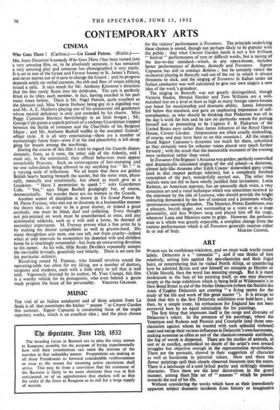CONTEMPORARY ARTS
CINEMA
MR. JOHN DIGHTON'S comedy Who Goes There !has been turned into a very amusing film, or, to be absolutely accurate, it has remained a very amusing play and someone has photographed it very nicely. It is set in one of the Grace and Favour houses in St. James's Palace, and never moves out of it save to change the Guard ; and its progress depends solely on verbal currents, the ebb and flow of voices eddying round a sofa. It says much for Mr. Anthony Kimmins's direction that the film rarely floats into the doldrums. The cast is perfectly fitted to its roles, each member, in fact, having excelled in his part many times before. There is Mr. Nigel Patrick, quite excellent as the pleasant cad, Miss Valerie Hobson being gay in a dignified way and Mr. A. E. Mathews playing one of his aristocratic old gentlemen whose mental deficiency is only just exceeded by his charm. Miss Peggy Cummins blarneys bewitchingly in an Irish brogue ; Mr. George Cole paints a superb portrait of a cockney Guardsman trapped between the Scylla of romance and the Charybdis of his Sergeant Major ; and Mr. Anthony Bushell waffles in the accepted Guards' officer style. It is all very entertaining—there are a number of enchantingly funny lines—even if at the end plausibility is left strug- gling for breath among the tea-things.
During the course of this film I tried to regard the Guards dispas- sionately, from, as it were, the other side of the Atlantic, and I must say, to the uninitiated, their official behaviour must appear remarkably Prussian. Such an extravaganza of feet-stamping and no one subordinate being allowed to say anything but " Sir ! "in a varying scale of inflections. We all know that there are golden British hearts beating beneath the scarlet, but the outer man, physi- cally, mentally and emotionally, has about as much give as a Gauleiter. "Have I permission to speak ? " asks Guardsman Cole. "Yes," says Major Bushell grudgingly but, of course, democratically. No wonder there are no women in the Guards.
Another aspect of discipline is shown in Un Grand Patron by M. Pierre Fresnay, who sets out to illustrate in a businesslike manner the theory that, in order to be a great doctor, or indeed a great anybody, one must be blind, deaf and unfeeling. Every thought not pin-pointed on work must be anaesthetised at once, and any sentimental addenda, such as a wife and a home, be deemed of secondary importance. M. Fresnay proves what a fine artist he is by making his doctor sympathetic as well as granite-hard. His many thoughtless acts stem, one can tell, not from cruelty—indeed when at odd intervals he remembers his deserted wife and childless home he is touchingly remorseful—but from an unwavering devotion to his career. As his wife, Mlle Renee Devillers repeatedly accepts the inevitable lovingly, gracefully and bitterly. There is no cure for his particular sickness.
Revolving round M. Fresnay, who himself revolves round the operating-table too often for my liking, are a number of doctors, surgeons and students, each with a little story to tell that is well told. Vigorously directed by its author, M. Yves Ciampi, this film is a worthy vehicle for its protagonist, who even behind a gauze mask projects the force of his personality. VIRGINIA GRAHAM.


































 Previous page
Previous page